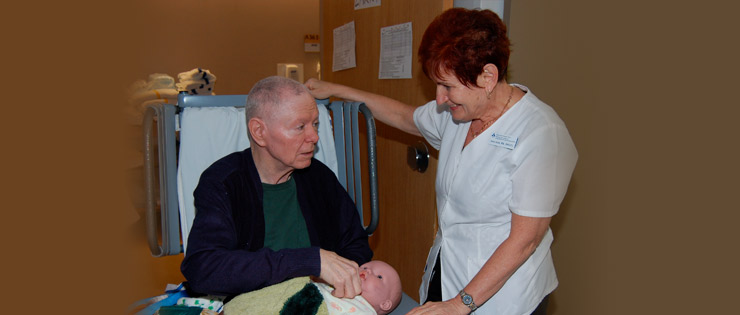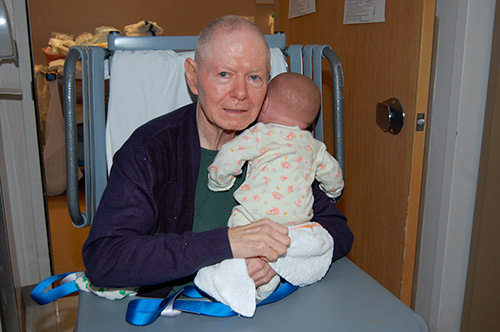
Geriatric Behavioural Support Nurse Vera Hula helps Larry Corrigan, a patient with dementia, wrap a baby doll – part of Gentle Persuasive Approaches to handling dementia behaviours.
Larry Corrigan wraps the baby doll in a blanket, then unwraps and rewraps her again. He spends long periods burping the doll against his shoulder, singing to her and rocking her to sleep. The doll helps keep his agitation – behaviour that’s part of his dementia – under control.
“The doll has been the best thing,” said his wife, Shannon Corrigan. “If he’s not having a good day, I give it to him and he calms right down.”
The doll is an example of the Gentle Persuasive Approaches (GPA) that Geriatrics team members at The Ottawa Hospital use when working with patients who have dementia. This person-centred, evidence-based philosophy can help manage non-purposeful agitation, such as calling out repetitively, jiggling legs, wandering, pacing, or searching for things.

Patient Larry Corrigan loved rocking his sons when they were babies, so caring for a baby doll helps calm his dementia-associated agitation.
“Every behaviour has a meaning, and is often a response to an unmet need,” explained Laura Wilding, Advanced Practice Nurse for Geriatrics. “GPA is a philosophy of looking at all the factors behind that behaviour and then coming up with strategies to manage it. Are they bothered by noise in the hall? Close the door or put on some soothing music. Are they distracted by their coat and want to go home? Hide the coat. Are they bored because they haven’t got rid of their energy for the day? Keep them active and find what interests them.”
Mr. Corrigan, who had worked as a computer systems analyst for Energy, Mines and Resources, responds to the doll because he has always been a caring father to their two sons, said Mrs. Corrigan. He rocked them as babies, coached them in baseball and hockey, and remained close as adults.
“It doesn’t shock me that he took to the doll that way,” she said. “He was very involved with his sons right from day one.” Music also calms him – he used to sing and play bass in a band called Eastern Passage. He often sings now and listens to music – Roy Orbison is a favourite.
Other patients are often calmed by doing puzzles, colouring, or looking at photo albums of nature, faces or sunsets.
Along with the Geriatric team’s many services, including pharmacological and medical management, the Geriatric Psychiatry Behavioural Support team is available to help any hospital staff manage patient behaviours associated with dementia.
The team promotes the use of GPA throughout the hospital. An eight-hour training course is offered through Nursing Professional Practice’s Geriatric Education Days. The team is also taking part in a provincial study to look at developing an online GPA course, so more people can learn about these effective approaches.
Check out resources for caring for patients with dementia at Ottawa’s Alzheimer Society, Advanced Gerontological Education, the Regional Geriatric Program of Eastern Ontario and the Ontario Medical Association.

Support patient care and research at
The Ottawa Hospital


 To reset, hold the Ctrl key, then press 0.
To reset, hold the Ctrl key, then press 0.
Comment on this post